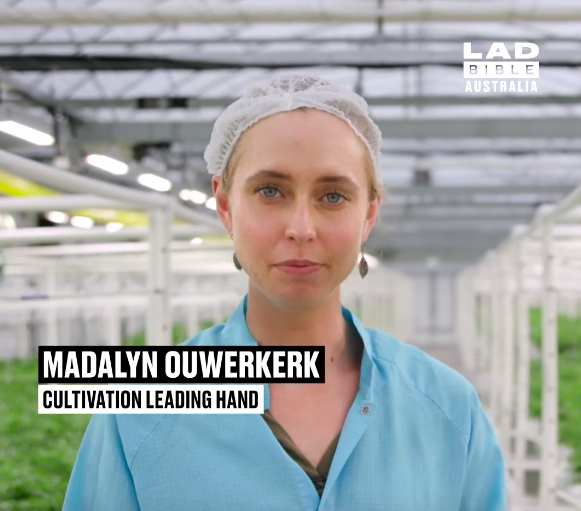Cannatrek has launched a marketing campaign with digital publisher LADbible aiming to educate its audience on the benefits of medicinal cannabis.
The firm’s head of marketing Paul Schwartz told Cannabiz the opportunity emerged after LADbible covered the topic late last year. It proved so popular the publisher asked Cannatrek to produce more content on the benefits of the plant.
Schwartz said the first iteration of the campaign – featuring video footage from a greenhouse, an interview with a grower and a focus on quality – was deliberately science-driven in order to remove the stigma around medicinal cannabis and position the sector as “a legitimate, bonafide industry”.

He added: “They know how to create messaging for their audience that resonates. But at the same time, we want to show that [the industry] is very science-based, that there’s a legitimacy behind it.”
LADbible Australia launched in 2018, having built a huge following in the UK. By October 2021, it had grown a local audience of 11.8 million and a global audience of more than half a billion across its website and social channels.
Schwartz said the common perception of LADbible appealing to men in their 20s was an over-simplification, with its readership extending beyond Gen Z into other demographics, including a large female contingent.
He said: “It’s actually quite a wide demographic, up to [people in their] 40s. They did some coverage around cannabis last year and it was one of their top performing pieces.
“And that’s what prompted them to come to us, to someone in the industry, to help educate the market. That’s really what they want to do, to educate their audience.”
The company is working with a regulatory consultant to ensure its marketing complies with the Therapeutic Goods Administration’s advertising guidance on medicinal cannabis, although Schwartz said it was hard to get a definitive answer on what is, and isn’t, acceptable.
“Regulatory people will never give you a document that says ‘this is absolutely signed off as compliant’. They’ll say ‘this is our recommendation based on what we understand’.

“The one we use has a very good understanding of this space, but it’s still a grey area. And it’s always a challenge playing by the rules, knowing there are many who don’t, and not much happens [to them].”
As a marketer for a cannabis company, Schwartz said briefing an agency often proves challenging as they do not initially understand the nuances of the industry.
“Ultimately it comes back to me to advise and guide them on what you can and can’t do in the market. You could spend your lifetime in this industry being a teacher and you don’t want to do that, so you look for long-term partnerships. I would say it takes a minimum of six months to really understand the market, to really delve into it.
“It’s a really interesting challenge from a marketing perspective, to be working in a space where you can’t actually market the product.”
Schwartz said the need for expertise would likely lead to companies building their own in-house marketing teams in future.
“I’ve run a marketing business for many years, and it’s relied on a model of managing external providers globally, brought together to deliver on projects,” he said.
“But as cannabis companies grow, they will really need to start looking at building internal resources, effectively an internal marketing agency.”
Schwartz said the LADbible campaign, which is running mosty on Facebook and Instagram, is on target to deliver three million impressions, 2.4 million people reached and half a million video views.
Users click through to telehealth service Balnce, where they are connected with a doctor specialising in plant-based treatment.

However, despite the success of the campaign in terms of eyeballs, Schwartz said it was equally important to measure success by customer retention, with education again the key to unlocking loyalty.
“A lot of the focus is on existing users, people who understand the market, but let’s focus on the millions of people out there who don’t understand anything about medicinal cannabis.
“How many people have heard about it? They’re seeing it a lot more in mainstream media, but there’s a lot of education that’s required around it.
“And as we know, at the moment it’s not cheap. It’s not cheap to have an appointment with the doctor who prescribes it. It’s not cheap to get the product. So people aren’t going to just automatically say ‘great, I’ve heard about this new medicine that might help, I’m going to jump in and start spending’. It’s A$300 minimum, $10,000 a year to use it properly.
“There’s a massive education piece needed. But a lot of the telehealth clinics skip that step and go straight to brand awareness and trying to get people through the door purchasing products and seeing doctors.
“If you jump the gun, it’s a missed opportunity. Ours is a slow and steady approach, educate the market, educate them really well, get them comfortable.
“If you look at the top 10 questions people ask about medicinal cannabis on Google, there’s your top 10 campaigns. ‘Can I get high from it?’ ‘Can I drive?’ ‘What is it?’ ‘How do you take it?’ [Building campaigns around those questions], that’s not branding, that’s not brand awareness, that’s education.
“The next step is, ‘how do I get it?’ That’s basic marketing logic.”
“It’s a really interesting challenge from a marketing perspective, to be working in a space where you can’t actually market the product.”
cannatrek head of marketing paul schwartz
When asked about the recent controversies around telehealth services, Schwartz said it was important to balance patient care with the need for financial sustainability.
“If you said to a doctor, ‘what is the perfect care model?’ they would say, ‘there’s no time limit on how often or how long we see a patient, the medication and the consultation costs nothing’,” he said.
“That’s the perfect care model, but that’s not viable or scalable. So how do you scale? You’ve got to be commercial. You’ve got to have time limits on consultations. You’ve got to set prices for medicines.”
However, Schwartz said it was important to find the right balance between the commercial model and patient care in order to retain customers.
“I could turn on a campaign tomorrow and get 10,000 people coming through the door for a consultation. But what does that mean? Once you’re through the door, what does the care look like?”
Schwartz said the LADbible campaign will evolve as it rolls out, with creative always focused on education. Whether there will be campaigns with other digital platforms targeting different demographics will “come down to time and resources”, he said.
For now, he’s happy that the current effort has been driven by user engagement.
“We all know this is a patient-led or public-led industry. And this is just another really great example. If we can accelerate that on behalf of everyone out there, then we’re happy to.”

